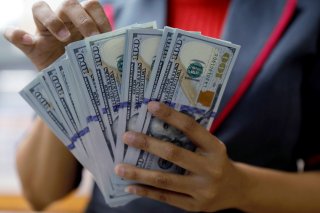Know This: Unemployment Benefits Aren’t Keeping Americans from Working
More than a dozen GOP-led states cut off some form of the $300 weekly unemployment bonuses, including the benefits set aside for the gig economy and self-employed workers.
Here's What You Need to Remember: Authors Nicolas Petrosky-Nadeau and Robert G. Valletta released a model in the paper that said the decision to accept a new job position depends on a number of reasons, such as “the expected duration of the employment,” “the rate of arrival of new job offers” and “the duration of [unemployment] benefits remaining.”
A new paper found that the $300 weekly unemployment benefits sent out during the pandemic likely have just a small effect on recipients’ decisions to reenter the labor market.
The study, published by the Federal Reserve Bank of San Francisco, noted that their findings "suggests few would turn down an offer to return to work at the previous wage."
Authors Nicolas Petrosky-Nadeau and Robert G. Valletta released a model in the paper that said the decision to accept a new job position depends on a number of reasons, such as “the expected duration of the employment,” “the rate of arrival of new job offers” and “the duration of [unemployment] benefits remaining.”
The authors applied that model by saying that a typical high school-educated worker making $800 a week before the onset of the pandemic would “not have been deterred from accepting a job offer,” even if jobless insurance was 25 percent more than wages.
“From the perspective of the first week of June 2020, with 8 weeks of supplementary UI payment remaining and as states were moving to re-open their economies, only workers in the lowest paid occupation (food services, with typical earnings of $460 per week) would be about indifferent between accepting an offer and remaining unemployed. For all other occupations replacement rates over 100% under CARES were unlikely to be the cause of rejected job offers,” the authors wrote. “The value of a job, especially in a depressed labor market, significantly outweighs the value of the temporary additional UI income.”
Under the Cares Act that was passed last year, Congress authorized $600 weekly jobless benefits for unemployed Americans, a measure that’s expired, while President Joe Biden’s recent rescue bill approved $300 weekly bonuses through September. The authors compared the different rates of unemployment compensation, revealing that the $600 supplemental benefit had “moderate disincentive effects” on job finding rates and the $300 benefit that’s currently in place suggested only “small effects.”
The study clashes with the GOP’s arguments that the jobless aid is a key contributor to the labor shortages across the country and a factor that is slowing down America’s economic recovery. Republicans contend that the expanded benefits have prevented people from going back to work.
More than a dozen GOP-led states cut off some form of the $300 weekly unemployment bonuses, including the benefits set aside for the gig economy and self-employed workers.
Republicans have also pointed to April’s lower-than-expected jobs report, which added only 266,000 new jobs and saw a slight increase in the unemployment rate.
Small businesses, as well as bars and restaurants, have had a difficult time finding people to fill empty positions as the country reopens with millions of Americans vaccinated.
This article first appeared earlier this year.
Image: Reuters.

